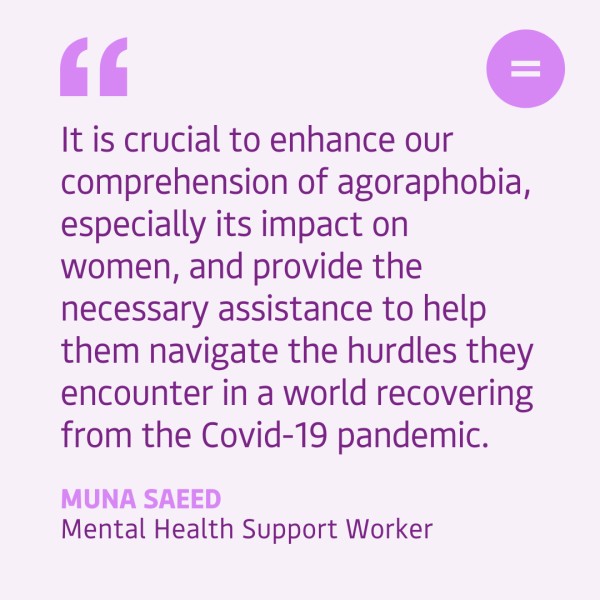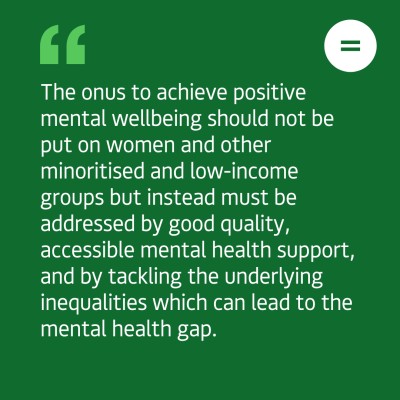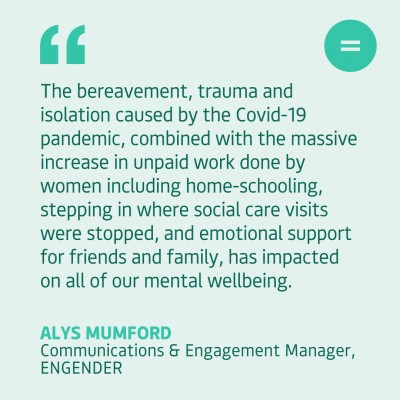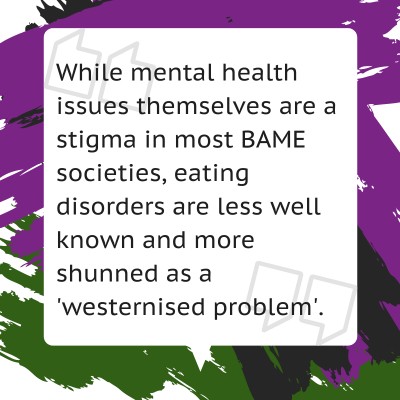Engender blog
New report reveals devastating impact of Covid-19 on access to pregnancy and maternity services
Engender and the Health and Social Care Alliance Scotland (the ALLIANCE) have today published a new report spotlighting women’s experiences of pregnancy and maternity services during the Covid-19 pandemic.
The report, ‘“Trauma, abandonment and isolation”: Experiences of pregnancy and maternity services in Scotland during Covid-19’, draws on survey responses from over 200 women across Scotland. It documents the profound and negative impact that public health restrictions had on access to vital healthcare across all aspects of these services from antenatal care, fertility treatment, to miscarriage and baby loss, birth and the postnatal period.
Key findings include:
- Confusing, contradictory and limited communication about Covid-19 mitigation measures caused extreme anxiety and distress for pregnant women.
- The shift away from in-person care to remote appointments was a barrier to adequate standards of care.
- Isolation as a result of restrictions negatively affected all aspects of pregnancy and maternity care. Women underwent invasive procedures, gave birth, and suffered miscarriage and baby loss without support, suffering trauma as a result.
- Inflexible and inconsistent application of guidelines across different health board areas and health settings led to uncertainty and perceptions of unfairness.
- A narrow focus on labour and delivery meant wider health needs were overlooked, including mental health and breastfeeding support.
- Gendered health inequalities, such as pain management and the lack of an intersectional approach, were exacerbated by the pandemic.
- Ongoing impacts include gaps in mental health support and experiences of trauma relating to isolation and poor care.
Jill Wood, Policy Manager at Engender, said:
“This research indicates that Covid-19 guidance and its application fundamentally failed to take account of women’s diverse needs and experiences during pregnancy and early motherhood. Confusing and contradictory communication, lack of in-person care and support, inflexible restrictions and inconsistent approaches across health board areas all undermined access to safe, dignified and quality healthcare.”
“The trauma caused by attending procedures and giving birth alone and the subsequent isolation, lack of support and adequate care, will stay with women long into the future."
"Scottish Government must learn from this, improve maternal health more broadly, and deliver on commitments on women’s health.”
Jane Miller, Academy Programme Manager at the ALLIANCE, said:
“Pregnancy and early parenthood can be challenging at the best of times. Our research shows that mitigation measures brought in during the pandemic exacerbated isolation and anxiety for many women in Scotland.”
“There is now an urgent need to centre the experiences and priorities of women in the ongoing Covid-19 Inquiry, and in the development of any future emergency guidance regarding healthcare. We must mitigate the risk of isolation and adopt flexible, person-centred approaches grounded in human rights and gender equality.”
A research participant said:
“It is essential that Scotland learns from people's experiences during the pandemic to improve maternity services and public health messaging. To do otherwise would be to fail, and further compound the trauma, of thousands of parents over the last few years.”
The report concludes with a series of recommendations aimed at the Scottish Covid-19 Inquiry and decision-makers in Scottish Government and health bodies. It highlights the need for a gendered and human rights approach to crisis management regarding healthcare, and for policy and services to take account of women’s particular experiences and needs at all life stages.
The report will be submitted as evidence to the Scottish Covid-19 Inquiry.
Read the report online here.
GUEST BLOG: Agoraphobia and Gender Post Covid-19
Women’s social, economic, cultural and political inequality with men undermines good mental health and wellbeing in a wide range of ways, including the impacts of gender stereotyping, medical misogyny and racism, and of course the disproportionate impact that austerity, Covid-19 and the cost of living crises have on women's mental health.
In this long read, guest author Muna Saeed explores the impact of gender on agoraphobia, and how this affects women in the aftermath of the Covid-19 pandemic.

Imagine a world where the thought of leaving your home fills you with dread and anxiety.
As the world outside continues to spin, you're trapped inside, desperately seeking comfort from the chaos that lies beyond your front door. This is the reality for those diagnosed with agoraphobia, a condition that goes beyond a simple fear of public spaces. It's a suffocating fear of being in situations where escape is difficult, and the fear of panic attacks threatens to consume your every waking moment. But what happens when we introduce gender into this equation? As a mental health worker who works closely with individuals grappling with mental health challenges, including agoraphobia, my aim is to shed light on the intricate and gendered complexities of this condition in a post-Covid-19 world.
The mental health gap for women in Scotland

Women’s social, economic, cultural and political inequality with men undermines good mental health and wellbeing in a wide range of ways, including the impacts of gender stereotyping, medical misogyny and racism, and of course the disproportionate impact that austerity, Covid-19 and the cost of living crises have on women's mental health.
Recently Engender was invited to speak to civil servants working in the Scottish Government's Mental Health Strategy and Co-ordination unit, about the ways in which women's ineqaulity and mental health intersect. Here are some of the things we spoke about.
Covid-19 and Mental Health
Engender has been working with Close the Gap, and other women's organisations across the UK, to carry out some polling work to see how Covid has impacted on women's lives. We published the our first findings from this study - focusing on the impact on women with childcare responsibilities - back in March and you can read it here. Our next report looks at the impact of the Covid-19 pandemic on women's health.

This week marks Mental Health Awareness Week, in a year which has seen women's mental health be challenged like never before. The bereavement, trauma and isolation caused by the Covid-19 pandemic, combined with the massive increase in unpaid work done by women including home-schooling, stepping in where social care visits were stopped, and emotional support for friends and family, has impacted on all of our mental wellbeing.
As part of our work for a gendered recovery, we carried out a survey on the impacts of COVID-19 developed alongside Close the Gap, the UK Women’s Budget Group, Fawcett Society, Women’s Equality Network Wales, and Northern Ireland Women’s Budget Group. The survey was carried out by Survation between 18-27 February 2021 across the four nations in the UK.
GUEST POST: Food for thought
Dr Shridevi Gopi-Firth is a Speciality Doctor in Eating Disorders working in Scotland. Her international education and career, including third sector work across India, Russia and the UK have given Shri a wide exposure to diverse cultural, social, educational and healthcare settings, thus successfully complementing her lived experience and clinical skills to develop a holistic understanding of the person. Here, she explores how stigma around eating disorders can affect women in BAME communities.

Eating – the most basic need of all things living, from the prokaryotic amoeba to the Dalai Lama. So when this signal in the brain gets scrambled and the eating becomes disordered, the inevitable reaction of the general populace is confusion, indignation, frustration and pity – empathy is a far way off since one cannot truly understand what causes a person to turn away from this basic need. This is never more pronounced than in Asian and African cultures where food brings people together and is the centre of every festival and get-together, big and small. Food is serious business in these cultures – I mean, in Asia alone, there are several deities devoted to food, the growing of it, the eating of it, the digesting of it, the gifting of it – one does not mess around with the concept of food!
Downloads
 Engender Briefing: Pension Credit Entitlement Changes
From 15 May 2019, new changes will be introduced which will require couples where one partner has reached state pension age and one has not (‘mixed age couples’) to claim universal credit (UC) instead of Pension Credit.
Engender Briefing: Pension Credit Entitlement Changes
From 15 May 2019, new changes will be introduced which will require couples where one partner has reached state pension age and one has not (‘mixed age couples’) to claim universal credit (UC) instead of Pension Credit.
 Engender Parliamentary Briefing: Condemnation of Misogyny, Racism, Harassment and Sexism
Engender welcomes this Scottish Parliament Debate on Condemnation of Misogyny, Racism, Harassment and Sexism and the opportunity to raise awareness of the ways in which women in Scotland’s inequality contributes to gender-based violence.
Engender Parliamentary Briefing: Condemnation of Misogyny, Racism, Harassment and Sexism
Engender welcomes this Scottish Parliament Debate on Condemnation of Misogyny, Racism, Harassment and Sexism and the opportunity to raise awareness of the ways in which women in Scotland’s inequality contributes to gender-based violence.
 Gender Matters in Social Security: Individual Payments of Universal Credit
A paper calling on the Scottish Government to automatically split payments of Universal Credit between couples, once this power is devolved to the Scottish Parliament.
Gender Matters in Social Security: Individual Payments of Universal Credit
A paper calling on the Scottish Government to automatically split payments of Universal Credit between couples, once this power is devolved to the Scottish Parliament.
 Gender Matters Manifesto: Twenty for 2016
This manifesto sets out measures that, with political will, can be taken over the next parliamentary term in pursuit of these goals.
Gender Matters Manifesto: Twenty for 2016
This manifesto sets out measures that, with political will, can be taken over the next parliamentary term in pursuit of these goals.
 Scottish NGO Briefing for UN Special Rapporteur on Violence Against Women
Joint briefing paper for the UN Rapporteur on Violence Against Women.
Scottish NGO Briefing for UN Special Rapporteur on Violence Against Women
Joint briefing paper for the UN Rapporteur on Violence Against Women.

Newsletter
Sign up to receive our newsletter here:
Sign up to our mailing list
Receive key feminist updates direct to your inbox: